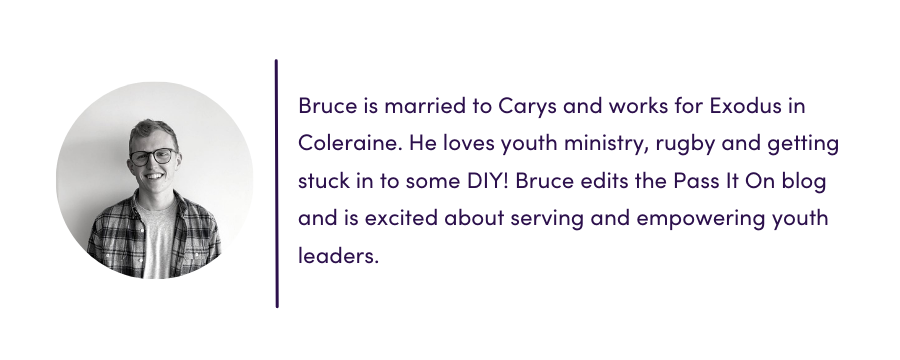As I’ve watched the crisis unfold in Ukraine, I’ve heard a few inspiring stories of how young people and youth leaders in Northern Ireland are responding to the crisis.
A teacher, gathering students at break time and inviting them to pray aloud in front of their peers.
A parent, facilitating their children to give their pocket money to those impacted by the crisis.
A youth leader, seizing the moment to address tough questions and unpack what it means to lament.
A group of students, donating a mountain of clothing and materials that are now on their way to Ukraine.

A youth group in Coleraine, praying for those suffering in Ukraine.
As we watch the crisis unfold, how are we helping young people to respond? Can we help them navigate the difficult questions it raises? Can we use our influence to build faithful followers who will respond when the world cries out in need?
As I listen to others, I note how our response to crises often falls into two camps.
In the first camp, we get analysis paralysis. (Go on, say that five times fast).
We consume everything. The news reports, the conspiracy theories, the TikTok videos, the opinions of our hairdresser (no offence intended to hairdressers!). Then, we attempt to navigate our way through a dense forest of ideas and opinions. We become paralysed. Information overload. Circuits fried.
In the second camp, we opt out and become disengaged.
It’s too far away. It’s too complicated and just too darn sad! I need to stay away from this negativity. I’m OUT.
The thing is, I’m not sure either of these really capture how Jesus intended us to engage in the world. Jesus models what it means to step out and serve others. He stood up for the woman caught in adultery, had compassion for the sick and was unafraid to flip tables when the moment came. At the same time, we see that he wasn’t marching to the drumbeat of the world. He took time to withdraw and pray and was quick to give his full attention to the needs of those right in front of him.
As I consider how Christ interacted with others, I’d like to propose an alternative paradigm for how we engage when a tragedy hits our TV screens: Prophetic Participation.
Woah - did he just use the word prophetic?
Pentecostals - chill out.
Let’s break it down.
Prophetic: I’ve no idea what Putin will do next. None. Maybe Putin doesn’t even know. What I’m sure of, however, is that a better kingdom is coming, one with a new heaven and a new earth (Rev 21:1). This means that as I pray, give or act, I do so with a confident hope toward the day when “the old order of things has passed away.” (Rev 21:4)
Participation: I’m not a world leader - thankfully! Despite this, I don’t have to sit on the sidelines or watch the experts get on with it. I’m called to do what made that Samaritan man good - stop and help. I have access to some resources. I have a small circle of influence. I have the Holy Spirit coursing through my veins. I can do something.
So, prophetic participation. How does that work out practically? To serve you as a youth leader, we’ve written a sample session titled Learning to Lament. This will help your group to think through what it means to engage in prophetic participation. It's based on some work from Jo, our Belfast Area Leader who took a similar session with her own youth group recently. It’s full of ideas that are simple enough for a small group, but exciting enough to get your teeth into.
We hope you find it helpful.
Get the Youth Group Session: Learning to Lament
SIGN UP for Pass It On emails.

